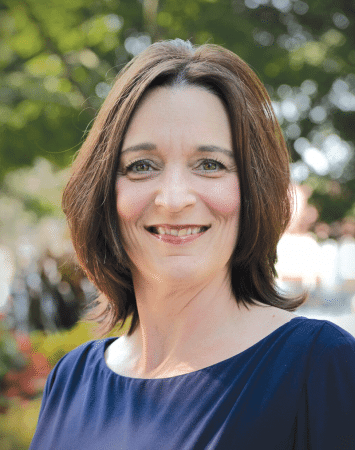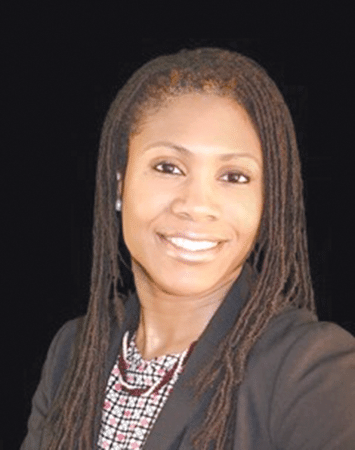
LIPPI Compels Women to Broaden Their Comfort Zones
Stepping Up

Northampton Police Chief Jody Kasper says LIPPI helped empower her to move aggressively up the department’s career ladder to the top rung.
Women who participate in LIPPI (the Leadership Institute of Political and Public Impact), a program launched by the Women’s Fund of Western Mass., use many terms to describe how it has impacted their lives and careers. Most eventually say the experience left them empowered — to seek public office, to apply for a job a few rungs higher on the ladder, or to take on a challenge they once thought was beyond them. In short, LIPPI helped take them far out of what had been their comfort zone.
It’s called the ‘impostor syndrome,’ a.k.a. the ‘impostor phenomenon’ and the ‘fraud syndrome.’
The term was originally coined nearly 40 years ago by clinical psychologists Dr. Pauline Clance and Dr. Suzanne Imes, who contrived it to describe high-achieving individuals who possess an inability to internalize their accomplishments and, as those above names suggest, live in what amounts to persistent fear that they will be exposed as an impostor or fraud.
Dr. Valerie Young, after first realizing that she suffered from that syndrome and that she was hardly unique in that self-diagnosis, would go on to become one of the world’s leading experts on the subject and write perhaps the definitive book on the matter: The Secret Thoughts of Successful Women: Why Capable People Suffer from the Impostor Syndrome and How to Thrive in Spite of It.
She has also taken her work regarding the syndrome on the road, speaking before hundreds of groups of various sizes and demographic breakdowns. One of them was a gathering last fall of the 2015-16 cohort of the Leadership Institute of Political and Public Impact, or LIPPI, as it’s more commonly called.
Created by the Women’s Fund of Western Mass. in 2010, LIPPI has hosted a number of speakers, like Young, who have helped change careers and lives by giving women of all ages something — or many things — to think about, insight that would stay with them long after the talk ended.
Jody Kasper, Northampton’s police chief, can recall one specific speaker — although she states with regret that she can’t remember her name — who certainly helped put her career on the path to the title that now graces her business card and office door.
“She said that a big difference between men and women becomes apparent when there’s an opportunity for a special assignment or promotion,” recalled Kasper, who was a detective with the force while participating in the 2012-13 LIPPI class. “She said a male candidate may — even if he didn’t know the material — say, ‘I’m going to put in for it, and I’ll figure it out once I get the job.’ And she said women candidates would be more likely to say, ‘I don’t really know how to do the job, so I’m not going to put in for it now; I’ll learn, and then, in a few years, I’ll put in for it when I feel more ready to do it.’
“That really stuck with me for some reason — that attitude holds women back,” Kasper went on, adding that those words were resonating with her when the post of detective lieutenant, one she admits to feeling not totally ready to seek at that time, came open — and she became an eventually successful candidate. The same attitude prevailed when the captain’s position came open.
“I had that same thought process … ‘should I be putting in for this? It’s a big job with a lot of responsibility; have I mastered what I’m doing now?’” she said of her eventual candidacy for captain. “And the answer was that I hadn’t mastered what I was doing; I was still in the learning stages of the detective lieutenant’s position. But I had the confidence to go for it.”
There are many similar stories to be told by LIPPI graduates, as they’re known. Indeed, while, as the name of the program implies, it puts emphasis on introducing women to careers in public service and helping them take on such challenges, it can — and does — provide women traveling down, or contemplating, a wide variety of career paths with more and deeper leadership skills.
When participants leave the stage with their diplomas in May, LIPPI organizers want them to take two things with them, said Ellen Moorhouse, who, as program officer for the Women’s Fund, has administration of LIPPI on her job description.
“The first is sisterhood,” she said, adding quickly that classmates form relationships that go on for years. “And also some tangible business skills — what it takes to write a professional e-mail, how we conduct ourselves in a meeting … what we call the nuts and bolts.”
For this issue and its focus on women in business, we take an in-depth look at how LIPPI provides not only nuts and bolts but the tools to use them, and how it leaves participants empowered to take on — and overcome — the many challenges their lives and careers will throw at them.
Learning Experiences
When asked what she considered her best takeaway from her LIPPI experience, Kasper, who was named chief last summer, paused for a moment, as if to indicate there were several aspects to be considered.
“I’m much more inclined to say ‘yes’ to things that are outside my comfort zone,” she said eventually, adding quickly that, because of this, that zone is now much larger and, thus, fewer challenges lie outside it.
While it’s not actually written down on a mission statement or anywhere else, providing women with a broader comfort zone is essentially what LIPPI is all about.
It accomplishes this through a series of monthly programs that essentially run along a typical college year — September to May with a break in December, said Moorhouse.
She told BusinessWest that the topics covered at those sessions speak volumes about what LIPPI was designed to provide for its participants.
Valerie Young’s program last October, for example, covered ‘Resilience, Public Speaking, and the Impostor Syndrome.’ In November, the subjects for discussion were ‘Social Justice, Race, and Equality.’ In January, it was ‘Mentoring and the Power of Your Network,’ and for February, the topic was ‘Conflict Resolution.’
Still to come are a broad March program focused on everything from communications and marketing to debating. Final presentations are in May, followed by an elaborate graduation ceremony at the Log Cabin on May 23.
Several of the monthly programs drive home one of the unique aspects of this leadership program — its focus on encouraging women to seek public service and helping them succeed if they do.
In late September, for example, the program was called ‘Performance Nuts & Bolts; Policy Advocacy; and Fund-raising Part 1.’ Part 2 came in March, along with a focus on personal finances, campaign finances, and ‘boardroom basics.’ In April, the program will be ‘Nuts & Bolts of Campaigning; Digital Tools and the Campaign,’ and on May 7, state Treasurer Deb Goldberg will be among those leading a discussion called ‘Women in Local, State, and National Politics — After the Campaign.’
It’s always a diverse group of women taking in these sessions, said Moorhouse, adding that this year’s class is especially so, with participants ranging in age from their early 20s to their mid-60s, and from a wide variety of backgrounds.
“This is our most diverse class yet — we have people coming from up and down the I-91 corridor and even New Bedford, and one of the women is almost 70 years old,” she noted, adding that the program draws women from the four Western Mass. counties, who must apply for the available seats — usually 30 to 40 a year.
When asked what the committee that weighs those applications is looking for, Moorhouse said simply, “passion.”
“And in whatever focus that might be,” she went on. “It could be political, or higher education … whatever their passion may be, it just has to shine through.”
The diversity of the LIPPI program, but especially the all-women nature of the program, makes it unique among the many leadership programs in the area and attractive to many potential candidates, Moorhouse went on, adding that many participants enjoy sharing common experiences, challenges, and approaches to business and problem solving.

Linda Tyer
Pittsfield Mayor Linda Tyer, a member of the LIPPI class of 2013-14, agreed. She told BusinessWest that, while mixed-gender leadership programs certainly have value, and women in every field must work alongside men, there are many benefits to having only women in the room.
“I’ve always been an advocate for advancing women in politics and in business, and this was an opportunity to participate in that pipeline, not only for myself, but for the women around me,” she explained. “And what happens when you participate in leadership programs for women is that you start to recognize yourself in others, and this enables you to learn from their experiences.
“Women have a collaborative nature versus a competitive nature,” she went on, listing another reason why she LIPPI’s program is valuable. “And you learn that collaborations do lead to success — everything isn’t a competition.”
Positions of Strength
Over the years, LIPPI has not only inspired women to consider and then pursue public service, but helped hone the skills and, yes, broaden the comfort zone of those already in office.
Tyer falls into both categories, actually. She was the city’s clerk when she became part of the LIPPI class of 2013-14, and prior to that served on the City Council.
She said the LIPPI experience helped provide her with the will and confidence needed to seek the corner office.
“I had an aspiration to become mayor, and participating in the program gave me more confidence in my leadership abilities to take that big step forward,” she noted, adding that several factors, including everything from her family situation to her collective experience in city government, collided to convinced her it was time to seize the moment.
And since taking office in January, she said there have been many times when situations and challenges have prompted her to summon lessons learned during her LIPPI sessions.
“I carry with me important lessons about public speaking and giving yourself a presence in a room,” she explained, adding that these represent just a few of the many ways in which LIPPI continues to influence her life and career.
Denise Hurst, a Springfield School Committee member, tells a similar story.

Denise Hurst
She had been on the board a short time when she was asked to be part of LIPPI’s inaugural class, and admits to having doubts about whether she really needed it.
Just a few sessions in — and actually before the cohort began its work — those doubts were completely erased.
“I sat on a panel that the Women’s Fund held as a kickoff for LIPPI, and it was probably then that it became readily apparent to me that I needed to go through this,” she recalled, “because there was so much that I didn’t know about being an elected official.
“I didn’t come from a political family — I had no real experience in politics or elected office,” she went on. “So I felt very much behind the curve with respect to my colleagues on the School Committee, but the types of training and workshops provided by LIPPI were extremely helpful.”
Elaborating, she described her LIPPI experience as an internship of sorts, one that provided hands-on training and many types of invaluable experience. And, like others we spoke with, she said that what LIPPI helped provide, above all else, is that priceless commodity known as confidence.
“You can listen to all the speakers in the world about how you build confidence and how you should be confident and how you shouldn’t be scared, but the reality is that, when you walk into the School Committee chambers or the City Council chambers or state government, you’re there alone … your mentor is not there,” she told BusinessWest. “You have to be quick, you have to be able to think on your feet, and LIPPI helps you do that; it helps you strategize.”
Speaking of Empowerment…
A visitor to Pittsfield City Hall would quickly learn that the mayor’s LIPPI diploma is not the only one proudly displayed.
Indeed, several members of what would be called the Tyer administration were part of the class of 2013-14, and Roberta McCulloch-Dews, director of Administrative Services, is one of them.
A former journalist who later started her own communications company and then held several positions, including assistant to the president, at the Massachusetts College of Liberal Arts in North Adams, McCulloch-Dews said she wasn’t really thinking about a shift into public service when she participated in LIPPI.
What she was thinking about was taking advantage of any opportunity that would expand her horizons.
“I’m a knowledge seeker — I love to learn,” she explained. “And I love to challenge myself with new ways of thinking. So when I heard about LIPPI and how it encouraged women to think about public service as another outlet, I thought it was important to learn about this area — even though moving into that realm wasn’t really feasible at that time.”

Roberta McCulloch-Dews
Or so she thought. Indeed, McCulloch-Dews said one of the many thoughts she took home from her LIPPI experience was the notion that one doesn’t have to wait until the conditions — especially a proper balance of work and family — are perfect to take a step into public service, or any other arena, for that matter.
“I would say that I came away from LIPPI empowered to know that I didn’t need to have everything fit perfectly to make the decision to go into public service,” she told BusinessWest. “I didn’t know at the time that I would be in public service now, but I think it was fitting to have that foundation, because it served to enrich what I’m doing now.”
Katherine VanBramer, Tyer’s executive assistant, was another member of that class of 2013-14, and she was technically already in public service while attending those sessions.
In fact, she was working for Tyer, as senior clerk.
Last November, Mayor-elect Tyer asked her to stay with her and become her executive assistant. This role would present a new set of challenges and even more work directly with constituents. But she credits LIPPI with helping to impart her with not only the confidence to make the shift, but the desire to take on a role where she would often be a liaison between the mayor and city residents.
“LIPPI definitely provided me with more self-confidence in dealing with the public,” she said. “And it really inspired me to appreciate how important it is to help people navigate their government, because it can be a tricky process sometimes. If there’s anything I can do to make the process more simple or more understandable, I’m happy and willing to do that.”
While all those we talked with related how LIPPI provided them with confidence and empowerment, they also talked with one voice about the power of mentoring, learning from others who have been through similar experiences, and how the relationships forged during their year certainly didn’t end when the diplomas were handed out.
They spoke also about how the program left them determined to mentor others and share collective knowledge and experience with those who are younger and walking where they were years ago.
“LIPPI has caused me to be more thoughtful about mentoring young women who are interested in getting into non-traditional fields,” said Kasper, noting that police work certainly falls into that category, and few women look in that direction simply because they lack role models — something she has become, and takes quite seriously.
“I’m in a position where I have a great opportunity to be a mentor,” she went on. “It’s an attitude I had before LIPPI, but that program really strengthened it.”
Moving Forward
Experts on the impostor syndrome say it is quite common, difficult to completely cure, but, in most cases, quite manageable.
The process starts with recognizing the condition, understanding that many others suffer from it, and addressing it. The last part of that equation generally amounts to building confidence and thus erasing those nagging doubts about one’s abilities, and developing a strong support system that can help keep them from coming back.
All of that isn’t on LIPPI’s mission statement, either, but that’s exactly what this unique program does.
That, and providing women across Western Mass. with a much bigger comfort zone.
George O’Brien can be reached at [email protected]





